Unit2 News media (listening)PPT课件
- 格式:ppt
- 大小:2.44 MB
- 文档页数:2
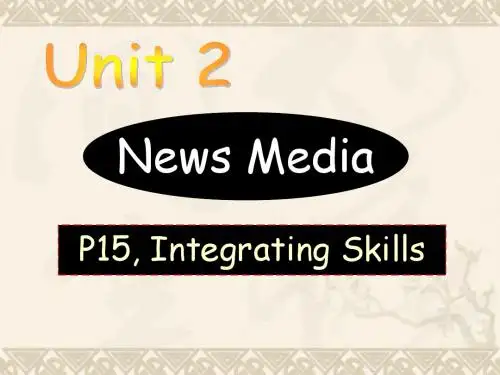
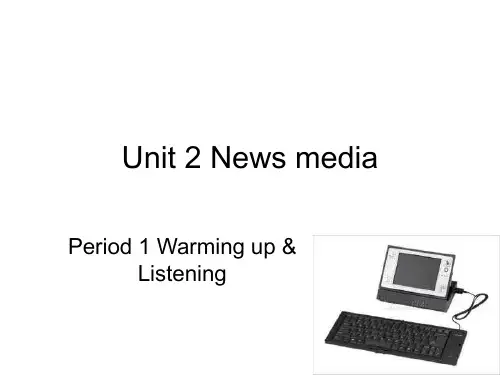
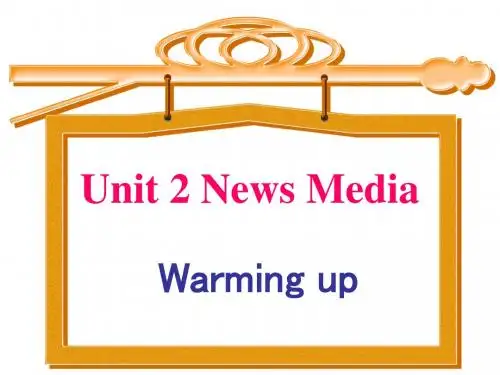
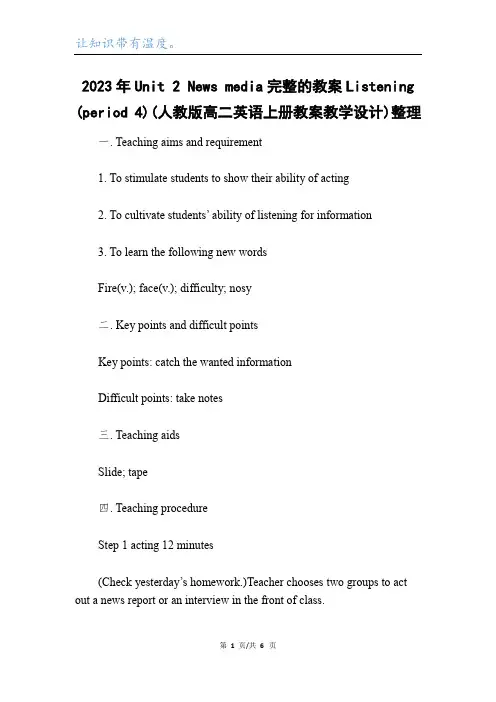
2023年Unit 2 News media完整的教案Listening (period 4)(人教版高二英语上册教案教学设计)整理一. Teaching aims and requirement1. To stimulate students to show their ability of acting2. To cultivate students’ ability of listening for information3. To learn the following new wordsFire(v.); face(v.); difficulty; nosy二. Key points and difficult pointsKey points: catch the wanted informationDifficult points: take notes三. Teaching aidsSlide; tape四. Teaching procedureStep 1 acting 12 minutes(Check yesterday’s homework.)Teacher chooses two groups to act out a news report or an interview in the front of class.Step 2 pre-listening 4 minutesT: Today, we are going to learn the listening part. Open your book to page 10. Let’s see the title first. There are two parts of the listening material, part 1 is an interview and part 2 is a dialogue. First, let’s learn those new words in exercise 1(the table below)New words are: fire; face; difficulty; nosy.Part 1 Part 2 Both NeitherThe man was fired.The man faced difficulties.The man was careful.The man talked too much.The man was funny.The man was nosy.The man was generous.The man was honest.The man was a nice person.The man was very clever.T: Exercise 1 asks us to choose the descriptions of Mr. Gray that have been mentioned in the listening materials. According to those descriptions, let’s guess what will they talk about Mr. Gray on the right two pictures of the book.T: Picture 1 is an interview. The fat man is called Mr. Keller and the other one is Mr. hunter. What do they do?Ss: an interviewer / reporter; boss/ headmaster/headquarterT: Maybe! What will they talk about Mr. Gray?Ss: …T: later, we will see who is right! What about picture 2? They are Mr. Gray’s friends---Paul and Wendy.Ss: …Step 3 while- listening (part 1, part 2) 29 minutesT: Well, we have done some guesswork about the listening material. Now, let’s listen to the tape for the first time. While listening, try to get the main idea and take some notes.(after listening)T: What do they talk about Mr. Gray in part 1/ picture 1?Ss: Something negative/ he was fired …T: What about part 2/ picture 2?Ss: Something positive…T: Very good! This listening material is a bit difficult. When we do listening exercises, we should learn to catch the information we want, that’s catch the key words. As for this exercise, we must pay attention to those words that describe Mr. Gray. Such as: careful, funny, honest. At the same time, try your best to write down the key words as quick as possible. In order to save time, you can use some simple symbols instead of those long sentences that you can recognize. (4 minutes)Part 1 15 minutesT: Ok, now, let’s listen to part 1 for the second time. While listening, finish exercise 1.(After listening, check answers)T: You have different opinions with some answers. Now, listen for the third time and find out the answers to those uncertain answers. This time, try your best to take some notes. Please write down what other things they have talked about Mr. Gray.(After listening, give the right answers of part 1)T: What have you written down?Ss: …T: ok, look at the slide. These are what the boss has talked about Mr.Gray.Now, listen for the last time to see if you can get all the information on the slide.(slide) too slowtalk too much; noisywild; not serious enoughnosyrude; said bad things about peoplecareless with his moneypart 2 10 minutesBecause teacher has taught some listening skills in part 1, and part 1 is really a good example. So teacher will speed up. And the steps are similar as part 1.(slide) face difficulties but not give upcarefulfunny; happykindgeneroushonest五. Blackboard workMr. Keller fire v. 开除Mr. Hunter face v. 面对Paul difficulty 困难Wendy nosy 爱管闲事的文档内容到此结束,欢迎大家下载、修改、丰富并分享给更多有需要的人。
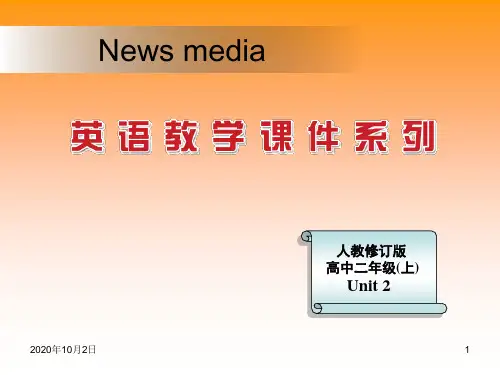
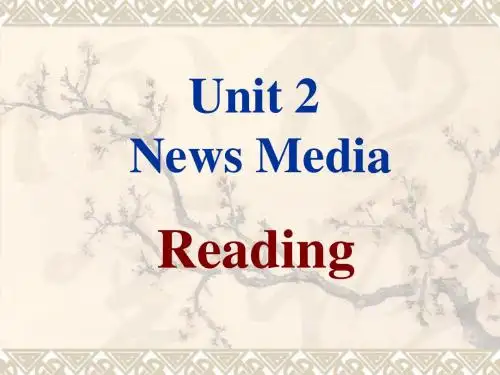
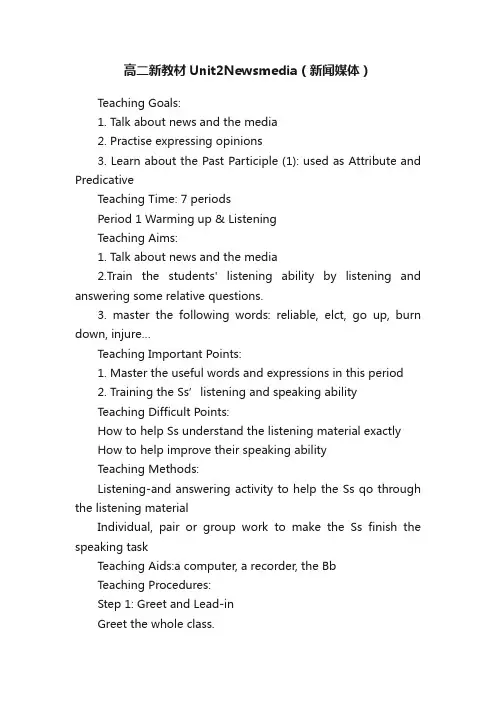
高二新教材Unit2Newsmedia(新闻媒体)Teaching Goals:1. Talk about news and the media2. Practise expressing opinions3. Learn about the Past Participle (1): used as Attribute and PredicativeTeaching Time: 7 periodsPeriod 1 Warming up & ListeningTeaching Aims:1. Talk about news and the media2.Train the students' listening ability by listening and answering some relative questions.3. master the following words: reliable, elct, go up, burn down, injure…Teaching Important Points:1. Master the useful words and expressions in this period2. Training the Ss’listening and speaking abilityTeaching Difficult Points:How to help Ss understand the listening material exactlyHow to help improve their speaking abilityTeaching Methods:Listening-and answering activity to help the Ss qo through the listening materialIndividual, pair or group work to make the Ss finish the speaking taskTeaching Aids:a computer, a recorder, the BbTeaching Procedures:Step 1: Greet and Lead-inGreet the whole class.Lead in the new unit by asking:the Olympic Games are going on, how can we know the details of the games? For example, how many golden medals have we got? (By reading newspapers and magazines,watching TV, listening to the radio, also by a website.) In Nglish we call it news media.Step 2: Warming upPlease open the book at page 9. Look at the pictures and discuss the following questions in pairs:1. Which of the news media above is the most reliable? Why?2. How are the media above different from each other?3. How do you know whether what you hear, see and read is true?4. Do you know how a newspaper is made?(Background information:新闻媒介的基本类型和特点各是什么?六种主要的大众传媒:口语、书籍、报纸、广播、电视、互联网。
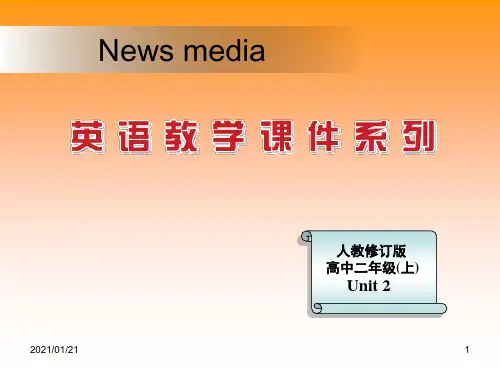
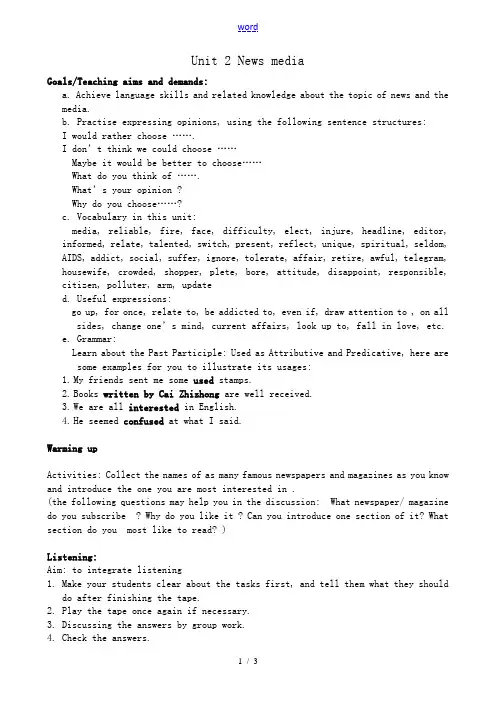
Unit 2 News mediaGoals/Teaching aims and demands:a. Achieve language skills and related knowledge about the topic of news and themedia.b. Practise expressing opinions, using the following sentence structures:I would rather choose …….I don’t think we could choose ……Maybe it would be better to choose……What do you think of …….What’s your opinion ?Why do you choose……?c. Vocabulary in this unit:media, reliable, fire, face, difficulty, elect, injure, headline, editor, informed, relate, talented, switch, present, reflect, unique, spiritual, seldom, AIDS, addict, social, suffer, ignore, tolerate, affair, retire, awful, telegram, housewife, crowded, shopper, plete, bore, attitude, disappoint, responsible, citizen, polluter, arm, updated. Useful expressions:go up, for once, relate to, be addicted to, even if, draw attention to , on all sides, change one’s mind, current affairs, look up to, fall in love, etc.e. Grammar:Learn about the Past Participle: Used as Attributive and Predicative, here are some examples for you to illustrate its usages:1.My friends sent me some used stamps.2.Books written by Cai Zhizhong are well received.3.We are all interested in English.4.He seemed confused at what I said.Warming upActivities: Collect the names of as many famous newspapers and magazines as you know and introduce the one you are most interested in .(the following questions may help you in the discussion: What newspaper/ magazine do you subscribe ? Why do you like it ? Can you introduce one section of it? What section do you most like to read? )Listening:Aim: to integrate listening1.Make your students clear about the tasks first, and tell them what they shoulddo after finishing the tape.2.Play the tape once again if necessary.3.Discussing the answers by group work.4.Check the answers.5.Finishing the listening tasks in the workbook.Speaking:1.Encourage your students to be brave enough to practice, and guide them to finishthe speaking task in the workbook..2.Allow them 10 minutes or more to do group work.:Begin the work with the following question: How do you get the news of the 28th Olympics? Then guide your students to discuss the advantages or disadvantages of the media you are familiar with.3.Ask every group to make one or two sentences using the words face/ fire/go up/burn downPre-reading: questions:Allow the students a few minutes to discuss the questions listed on the text book, and then do Q&A practice:---- How does a reporter decide what to write?---- How much does a newspaper cost?----Why do people read newspapers?----How do newspapers report what happens?----Where do people read newspapers?----How do newspaper help us understand the world?Reading:Skim the text to get the main idea of the passage, and then ask Ss the question: What does “Behind the headlines〞 really mean?Discussion in group of four or six:How can the media help solve problems? Give some examples.Writing:Ask students to develop what they have discussed into a passage of about 100 words. Tips for writing:Use correct tenses and sentence structurePay attention to punctuationCheck your work for mistakesPair activity: Improve writing by examine each other’s work and give advice.Language study:Ask students to study the following sentences and try to get the meaning of the sentences, encouraging them to use a dictionary if necessary.1.Experienced editors and reporters make informed decisions about what events toreport, how to report them, and why.2.The editor’s job is to keep the newspaper balanced and interesting to the readers.Grammar:Give some examples to students and ask them to study the usage of the Past Participle:1.the burned log/ an escaped prisoner/developed countries/fallen leaves.2.I bought some painted chairs.3.That is a newly-invented device.4.After a tiring day , you feel tired.5.Don’t get excited.6.Summer is gone.Ask them to make as many sentences as they can, using the infinitive.Integrating skills:Aims: improve reading and writing skills.1.Explain some important sentences and help students to solve problems they metduring the course of studying the two news items..2.Discuss what is included in a news item:4W+1H---- what/who/when/why+howOut-of-class work:Learn the new words and the useful expressions by heart.Read more news items about science from newspapers or magazines.Copy one news item from China Daily or other newspaper and study it carefully:1.Find 4W+1H in the news item;2.Write a piece of news using the skills you got in learning this unit.。
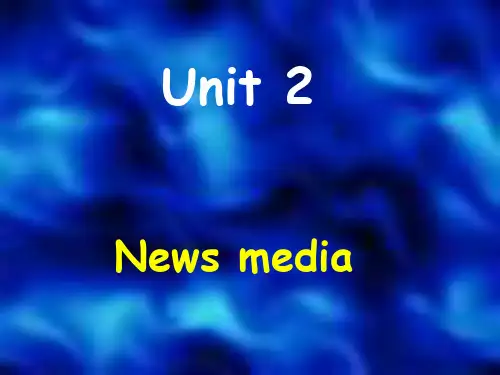
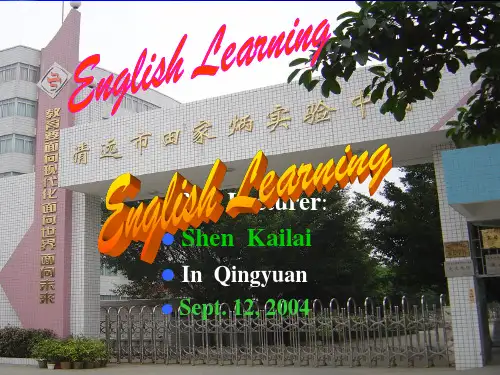
Unit2NewsmediaThe first lesson: warming up, writingTopic ∶talk about news and media一 Teaching aims and demands1, present the central topic of this unit 一一media. Help students get familiar with things related to media.2.learn some new words and expressions about media, that’s language preparation for learning the whole unit.3.practise expressing opinions二 key pointsFamiliar with different media; learn to be a critical reader三Teaching aidsA piece of newspaper, a magazine, a radio, television, a web page, slides.四 Teaching methodsPartner job, group discussion五 Teaching procedureStep 1 .greeting 30 secondsT∶ Good afternoon! I’m glad that I have this chance to study with you this week.Step 2. Lead-in 15 –17 minutesT∶Last month, the Olympic games was held in Athens. How many gold medals did our country get? Yes, 32! and do you know 刘翔 ? That handsome man? Right, he got the gold medal of 110-meter-hurdle race! Then how did you get that information?Ss: by watching TV, reading newspaperT: good! And we call TV, newspaper -----“news media”. This week, we are going to learn a new unit -----. Unit 2 news media.What does this word “media” mean in Chinese? Yes, it’s 媒体.and this translation is according to the pronunciation of “media ”. It’s the plural form of “medium”. Nowadays, there are many kinds of media, and what’s this? 〈show a piece of newspaper〉right, a newspaper. I think most of you like reading newspapers, and what do we call this page? 〈point to the front page〉yes, it is front page. What about the first part of it? Right, it is front-page headline. Headline is a new word of this unit. It means 标题。
高二英语Unit2 News media知识点汇总高二英语Unit2 News media知识点汇总Section I 课前准备、听力、口语1. Which of the news media above is the most reliable? 以上的新闻媒体中哪一种最可靠? (p.9 Warming Up Ex. 1)reliable adj. 可信赖的;可依靠的;确定的① They are reliable friends. 他们是可信赖的朋友。
② Is this product reliable? 这种产品的质量可靠吗? ③ Is the source of the information reliable? 那个消息的来源可靠吗?【链接】 reliably adv. 可靠地;确实地 / reliability n. 可靠性;可信赖性 / rely vi. 依赖,依靠 (与on连用,相当于depend on) ① We can't rely on her for help. 我们不可指望她的帮助。
② I rely on her to pay back the money. = I rely on her paying back the money. 我相信她会还钱。
③ You may rely on it that he will come to meet you. 你放心好了,他会来接你的。
2. How do you know whether what you hear, see or read is true? 你怎么知道你听见、看见或读到的东西是不是真的? (p.9 Warming Up Ex. 3)whether引起宾语从句,作know的宾语,what引起主语从句,作宾语从句的主语。
【辨析】what;which(1) what相当于all that,the thing(s)that,the place that,the person that等,表示从不定数目或不定数量的事物中做出选择。